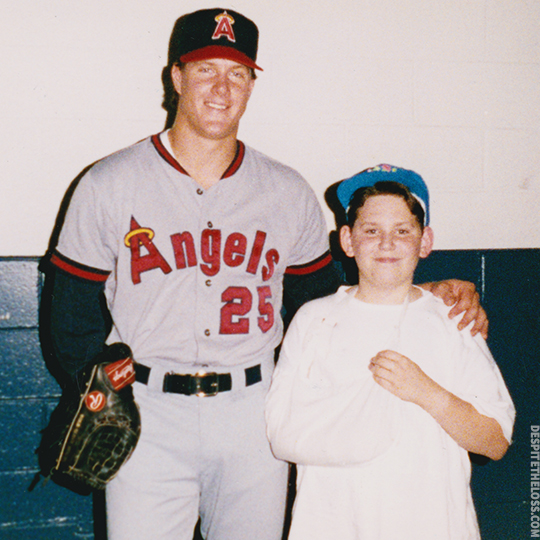Jim Abbott and Jason Schneider, circa 1991.
Shaquem Griffin dominated headlines this week after his incredible performance during the 2018 NFL Combine, and rightfully so. As someone who admittedly doesn't follow sports much, I found myself glued to the coverage. I felt a sense of pride watching Shaquem play, and rooted for him like I had never rooted for an athlete in my life. Why was I so obsessed? Representation.
While groups like the LGBTQ community and people of color have made subtle strides in recent years regarding representation (one can look at the electrifying response to Marvel's Black Panther as a step in the right direction for the latter), people with limb differences are still vastly underrepresented in society as a whole. We are the last taboo.
It's a powerful thing to see a reflection of yourself in the public eye, especially in high-visibility areas like sports and cinema. It got me thinking about another athlete who broke ground in this area back in the 1980's, Jim Abbott. If you don't know who Jim Abbott is I suggest you google him, as his accomplishments are too long to list here. But in the early 1990's, Jim was a professional baseball player pitching for the LA Angels, and I was a 12 year old boy recovering from an accident that took my right hand.
I was just a few weeks out of the hospital when I got to meet Jim, and it was a very scary time for me. I wasn't even a huge baseball fan, but that day impacted me in a way that forever changed my life.
In all honesty it was less of what he said (although warm and inspirational), and more of what he accomplished, that really planted the seed in me that I could strive to do anything I wanted in life. That I should never look at the loss of my hand as something that would hold me back. Missing a hand never stopped Jim, why should it stop me?
Post accident I've built and raced cars, played bass, even made films... but despite my successes, still struggled with the insecurities that come with being different. While making the documentary Despite The Loss, I started to examine what this meant to me for the first time in my life. Why did I hide my arm? Was I afraid of being labeled disabled? Did people look at me that way?
I was chatting with a coworker one day about meeting Jim (who happened to be a huge baseball fan), and she said, “I have his autobiography, you really should read it!”
As I read the book, I just couldn't believe it. Jim talked a lot about struggling with the same insecurities I'd been trying to tackle in my own life: the fact that he can still be uncomfortable with his limb difference, that he often hides it by burying his arm in his pocket. The book was a revelation to me, and made me feel less alone in the world.
This is one of the many reasons why representation is so important.
If I said that I set out with representation in mind while making Despite The Loss, I’d be lying. The film's underlying meaning changed profoundly during production, especially for me personally. But even in our initial stages of outreach, and through the feedback we're receiving from the limb difference community, I can already see that Despite The Loss has the potential to effect change far beyond my original intentions.
Much like what Jim's story did for me, and Shaquem's story will undoubtedly do for countless others, I share my journey in the hopes that by documenting my personal struggles Despite The Loss helps spark a conversation about the way we look at limb difference and disability in society, all while highlighting what the bumpy road to self acceptance looks like.
-- Jason Schneider



